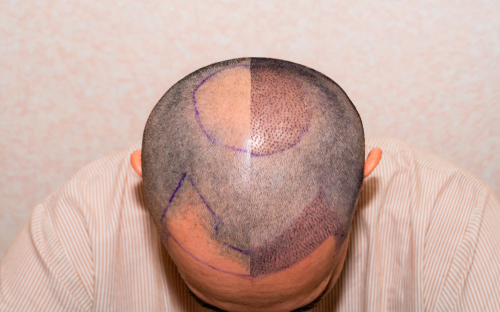
Do Oily Scalp Causes Hair Fall Problem?
November 22, 2021
Can Hair Implants Go Wrong?
March 6, 2022How To Care For Hair After Hair Implant?

How To Care For Hair After Hair Implant? Hair implantation is a surgical procedure that transplants hair follicles from the back and sides of the head to areas where hair loss has occurred. After receiving this procedure, these follicles will sprout new hair, which prevents baldness in patients who have lost their hair due to health or cosmetic reasons.
Hair implantation is not a permanent solution and hair loss will need to be treated continuously. During the postoperative period, hair replacement patients will need to take special care of their newly implanted follicles.
According to dermatologists, the first three months following a hair implant procedure are critical for ensuring that new hairs stay healthy. Hair replacement patients are advised to keep their original hair clean and healthy so that it supports its newly transplanted counterpart.
Hair replacement patients should avoid applying haircare products, which can cause excessive dryness or oiliness in the new hairs. Here are hair care tips that hair replacement patients need to follow after receiving an implant procedure:
Wash the New Hair Gently

New hair should be washed with a gentle shampoo two or three times a week. Be sure to use cool or lukewarm water, as hot water can damage newly implanted hair follicles. Washing too often can also strip the hair of its natural oils, so try to avoid over-washing. Too much shampooing can irritate the scalp and dryness in the new hair.
Moisturize New Hair

Conditioner should be applied to new hair two or three times a week. However, avoid applying too much conditioner because it can leave the hair looking oily and may clog pores in the scalp. The best time to apply conditioning products is after shampooing and before rinsing.
Do Not Blow-Dry the New

Do not blow-dry new hair, as it can cause excessive dryness in the follicles. Allow the newly implanted hairs to air-dry instead of using a blow dryer. If your hair is naturally curly, you can allow the new hair to dry in its natural state.
Do Not Use Heated Styling

Styling tools that use heat should be avoided for three to six months after receiving a hair implant procedure. Hot styling tools such as hot combs and heated rollers should be replaced with cool-to-warm styling tools like brushes.
If possible, avoid using these products altogether during the first three months after the surgery so that it does not damage the newly transplanted hairs or cause excessive dryness or oiliness in your scalp.
Protect the Hair from Excessive Sunlight

Exposure to sunlight can damage new hairs because ultraviolet radiation alters pigmentation in follicles causing discoloration. To protect new hair, use a hat or sunglasses when outdoors.
Avoid Tanning Beds

Tanning beds emit harmful UV radiation that can damage newly implanted hair follicles. Avoid using tanning beds during the first few months following surgery.
Eat a Balanced Diet

Eating a balanced diet is important for healthy hair growth. Make sure to include plenty of protein, fruits, and vegetables in your diet to help support new hair growth. A balanced diet includes plenty of protein, fruits, and vegetables in your diet to help support new hair growth.
Take Vitamins

Vitamins are essential for healthy hair growth. Be sure to take a multivitamin every day to ensure that you are getting all the nutrients you need for healthy hair.
Reduce Stress Levels

Hair loss is often caused by stress. To avoid further hair loss, reduce your stress levels as much as possible following surgery. Meditation, deep breathing exercises, and other stress-relieving activities are recommended for patients who lose their hair due to high-stress levels.
Avoid Shampooing the Frontal Hairline

After receiving a hair implant procedure, avoid shampooing the frontal hairline until after six months have passed. If you want to shampoo the area right away, use water only and wait for at least two weeks before using any type of shampoo or chemicals on this area. Keeping this area clean and free from product buildup will help ensure that new hair stays healthy and strong.
Use Gentle Products

When caring for newly implanted hair, use gentle products that will not cause any irritation. Shampoo and conditioner should be free of sulfates and other harsh chemicals. Look for products that are specifically designed for color-treated or damaged hair.
Avoid Tight Headbands

Tight headbands can put stress on hair follicles which causes hair loss. To avoid this from happening, wear loose-fitting or tie back your hair when you are wearing a tight headband. Tight headbands can put stress on the hair follicles and cause them to fall out. If you must wear a headband, tie back your hair and avoid tying it too tightly.
Avoid Sleeping With Hair in Braids

Sleeping with braids can place too much stress on newly implanted hair follicles. To avoid this, braid your hair loosely before bed or tie it back using a soft cloth. Avoid tying the cloth too tightly as this can also damage new hairs.
Trim Hair Every Two Weeks

Trimming the ends of your newly implanted hair every two weeks will help dull ends from splitting and becoming frizzy after being moistened by water in the shower. This means you should not use conditioner right after shampooing, wait several minutes to allow it to penetrate the hair shafts then rinse off with lukewarm water instead of hot water for best results.
Conclusion

So, how to care for hair after hair implant? Caring for hair after hair implant surgery is essential to maintaining healthy and strong hair. Be sure to follow the tips listed in this article to ensure that your newly implanted hairs stay healthy and strong. If your hair still falls out after following these steps, it may be time to consult with your doctor.




